 The aim is to assist the life of elderly people by developing info-communication devices and services. Innovative ICT-based products, systems and services promoting active and healthy aging at home, work or in a community can improve elderly people’s quality of life, autonomy, social life, skills and employability, and can increase the efficiency of health and social care.
The aim is to assist the life of elderly people by developing info-communication devices and services. Innovative ICT-based products, systems and services promoting active and healthy aging at home, work or in a community can improve elderly people’s quality of life, autonomy, social life, skills and employability, and can increase the efficiency of health and social care.
EU co-funded projects implemented in international consortia for the creation of marketable products and services promoting the objectives of the programme.
| Short name | AAL |
| Name | Active and Assisted Living Programme |
| Official website | www.aal-europe.eu |
| Year of foundation | 2008 |
| Number of member countries | 16 |
| Participating countries | Austria, Belgium, Cyprus, Denmark, Netherlands, Canada, Poland, Luxembourg, Hungary, Norway, Portugal, Romania, Spain, Switzerland, Slovenia |
| Hungary’s accession | 2008 |
| Public administration representative |
Szonja Csuzdi AAL General Assembly member National Research, Development and Innovation Office Department of International Affairs 1077 Budapest, Kéthly Anna tér 1. Phone: +36 1 896 3758 Email: szonja.csuzdi@nkfih.gov.hu Ágnes Divinyi AAL National Contact Point (NCP) National Research, Development and Innovation Office Department of International Affairs 1077 Budapest, Kéthly Anna tér 1. Phone: +36 1 896 3754 Email: agnes.divinyi@nkfih.gov.hu |
| Professional representative | - |
| Membership payments | 2015: EUR 10,000 (≈ HUF 3.3 million) 2016: EUR 10,000 (≈ HUF 3.3 million) 2017: EUR 10,000 (≈ HUF 3.3 million) 2018: EUR 10,000 EUR (≈ HUF 3.3 million) 2020: EUR 10,000 (≈ HUF 3.5 million) |
Benefits of the membership for Hungary
- Available funding for the development and commercialisation of products and services in the given field In addition to the Hungarian contribution, 42-49% of the funds provided to Hungarian applicants come from EU sources.
- Annual exhibition where new products and services can be presented among others to potential investors (social insurers, venture capitalists).
- The results of the programme, i.e. the new products and services, are potentially advantageous for all aging societies, including Hungary (social innovation).
- Since 2014, 25 Hungarian members have participated in 13 near-market development projects implemented in consortia and involving end-users.
Organisational framework
The programme is managed by the AAL Association. The members of the AAL Association are the countries participating in the AAL programme. Strategic decisions in the AAL programme are adopted by the General Assembly made up of delegates from the participating member states, while the issues relating to the operative management of the programme, the preparation and management of joint calls for proposals, and the preparation of national grant decisions are the responsibilities of National Contact Points The Central Management Unit (CMU) in Brussels organises consultations with the member states, the preparation and announcement of calls, the assessment of proposals, the monitoring of project progress, and actions facilitating project implementation.
Application
The programme is open to projects implemented in collaboration between at least three different independent institutions operating in an AAL member state (SMEs, large enterprises, higher education institutions, research centres or non-profit institutions) and resulting in innovative products, procedures or services that assist the elderly and whose commercialisation starts within two years from the completion of the project. To achieve the objectives of the programme, consortia shall include at least one for-profit SME and an end-user organisation. Based on the national eligibility criteria, Hungarian funding may only be provided to projects involving at least one profit-oriented Hungarian company.
First, a project proposal developed within the framework of an international consortium shall be submitted in accordance with the call for proposals available the the AAL website. The project proposal will be assessed and ranked on an international level. If the international proposal is selected for funding, each consortium partner shall apply for national support from their competent national authorities. Contracting and funding also take place at national level.






